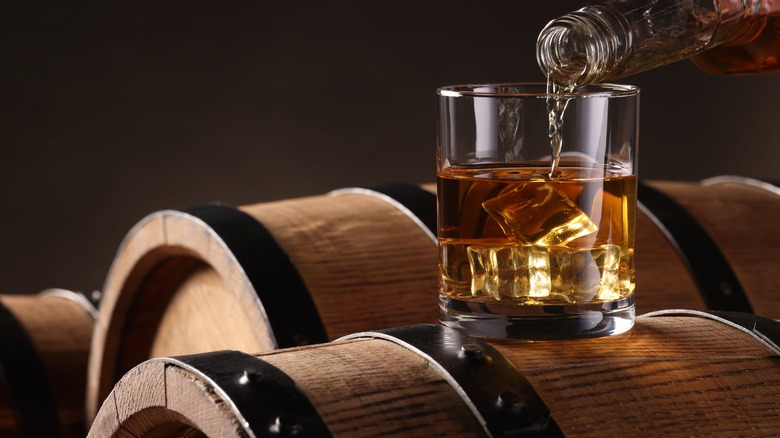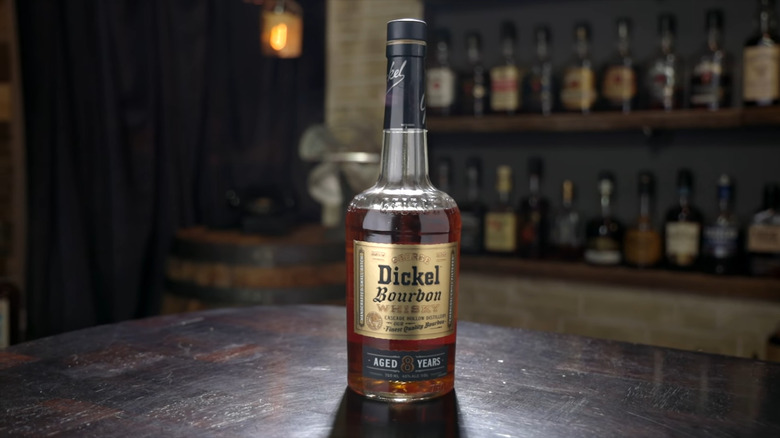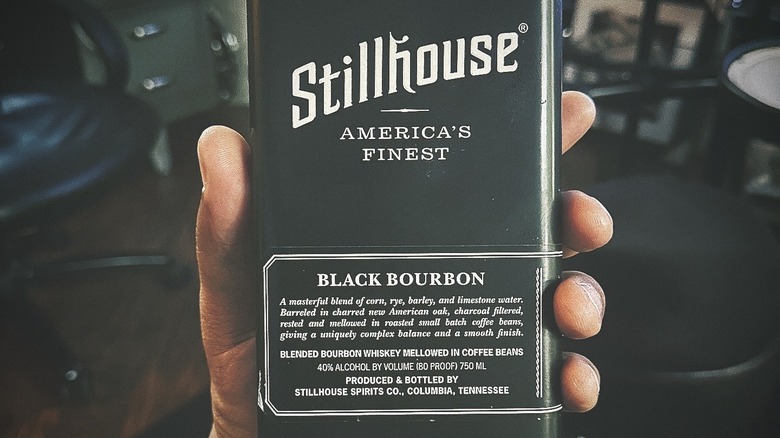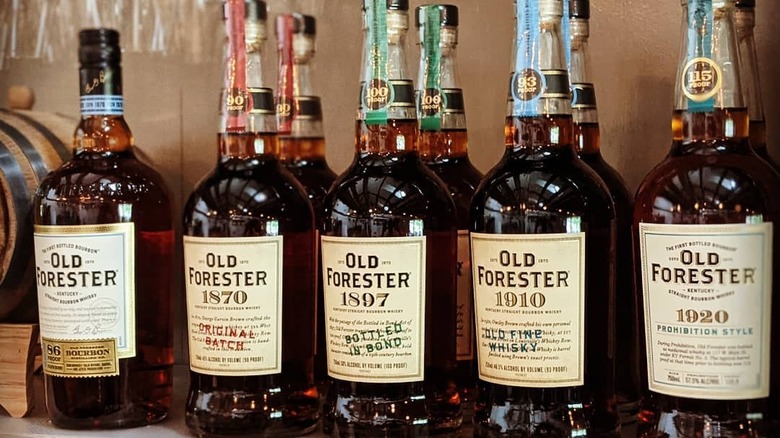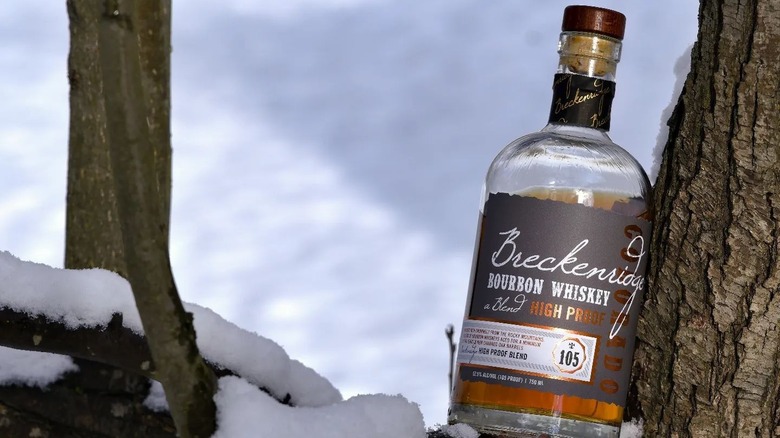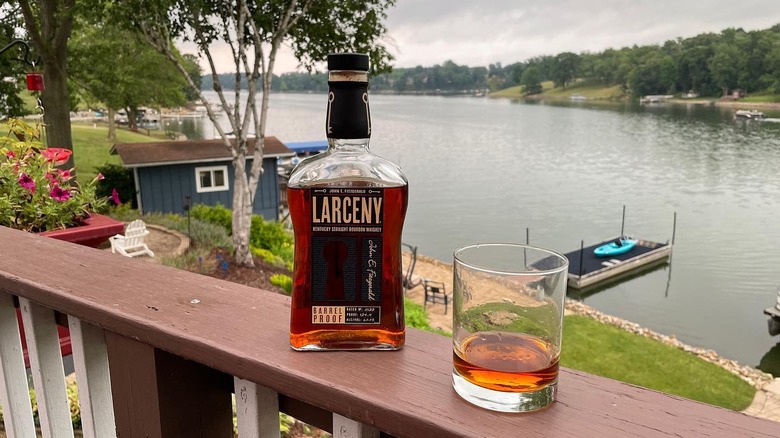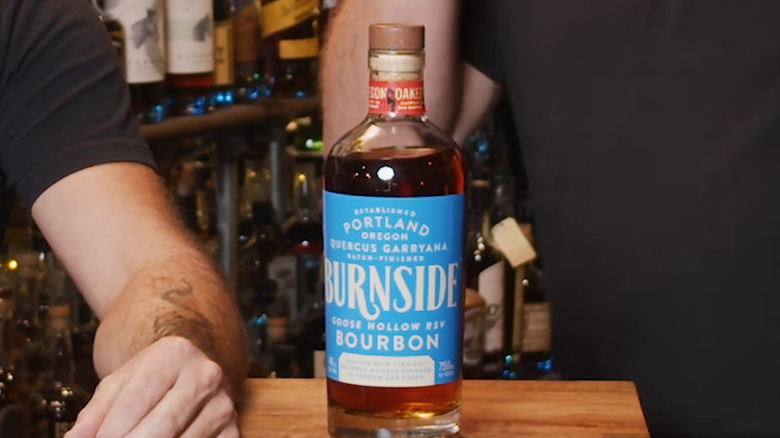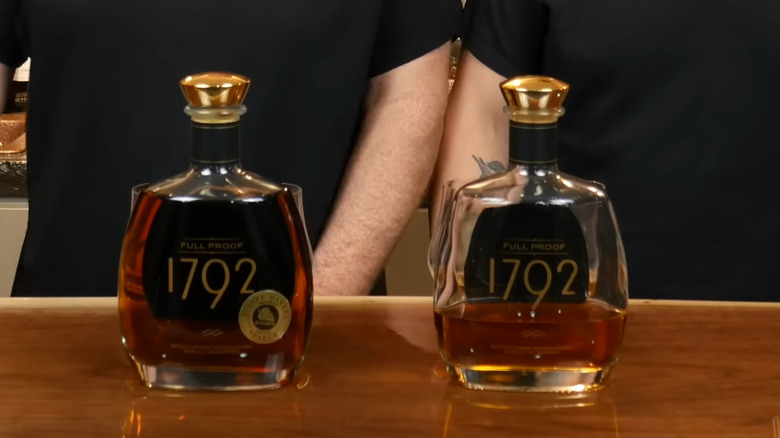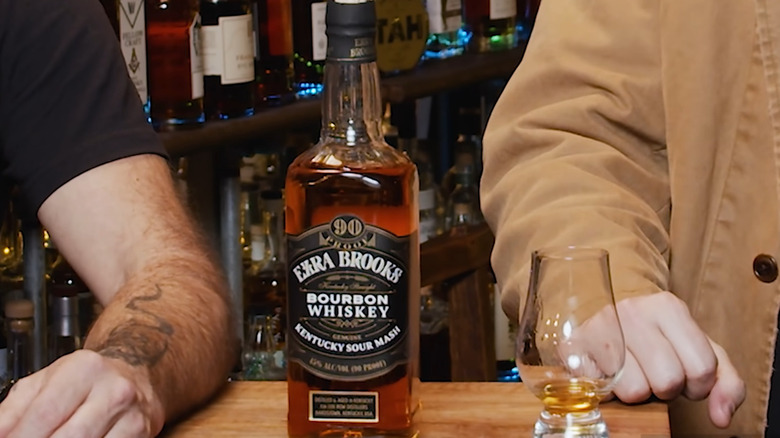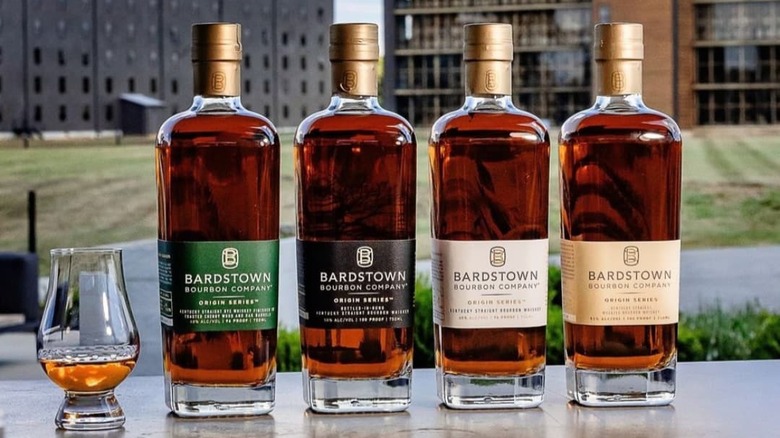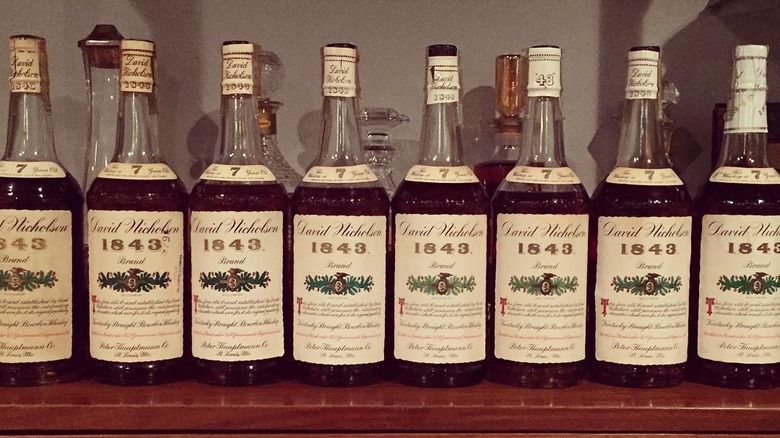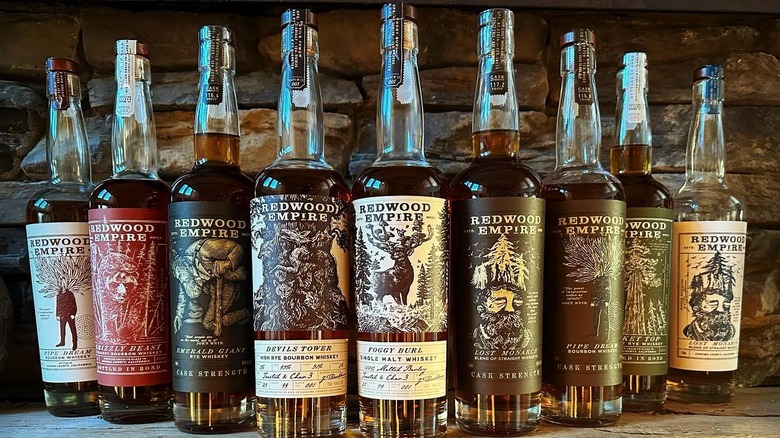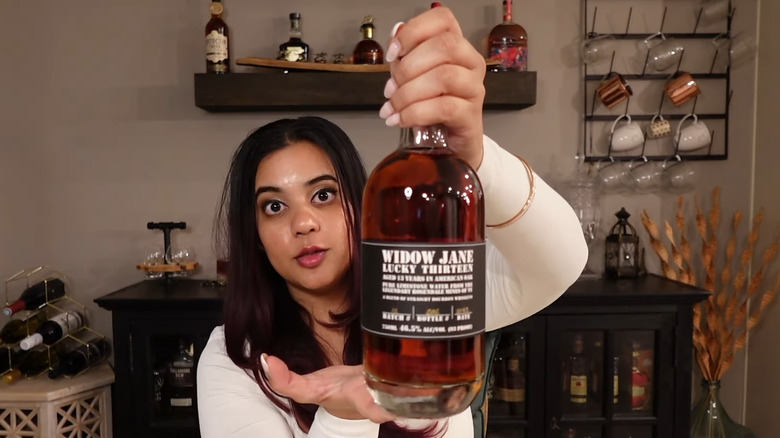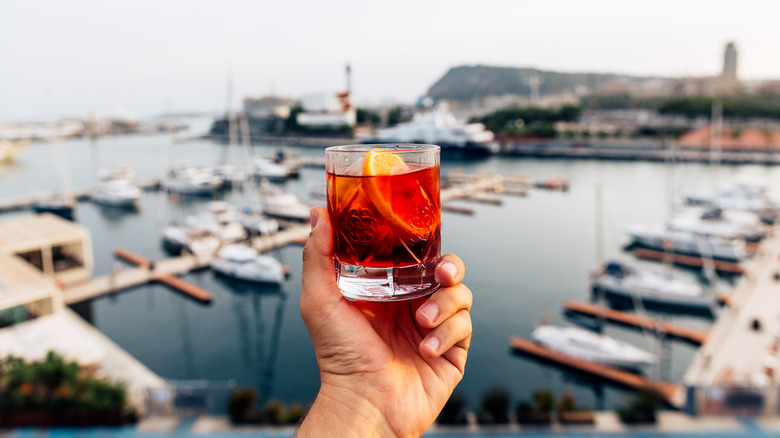12 Underrated Bourbon Brands You'll Wish You Knew About Sooner
Bourbon can be an intimidating drink to dive into. The timeless spirit is akin to wine in that blends and batches can hold both powerful and subtle notes of countless ingredients. There are also quite a few misconceptions when it comes to bourbon, which can add to its seemingly daunting mystique. One such misunderstanding is that not all whiskey is bourbon. The way bourbon is made and qualified is with at least 51% of corn. Another is that bourbon whiskey has to be made in Kentucky. This is actually not at all true, so I've scoured the U.S. for bourbons found in and out of the ABC stores to find some of the most underrated brands.
I worked in the service industry as a bartender and server for over seven years, and have been trained by whiskey experts to be able to taste and recommend different variants. Using my knowledge of whiskey along with many reviews of bourbon lovers and hobbyists, I've narrowed the countless brands of bourbon down to 12 solid, yet somewhat fringe brands. You should try these bourbons before they catch on, or keep your eyes out for new releases.
George Dickel
Though you can find it in nearly every liquor store and some bars, George Dickel is typically in the shadow of other bourbons like Evan Williams and their fellow Tennessee resident Jack Daniel's. This bourbon is actually one of my go-to cheap bourbons and one of the worst mistakes you can make when choosing a bourbon, in my opinion, is basing tastes on price tag.
In the bourbon community, Dickel can get a bad rap depending on whose word you hang on. The opinion of the bourbon seems almost split, with whiskey lovers either loving or hating the taste. When it comes to bourbon, though, it's best to trust your own taste buds rather than the opinions of others. Some, myself included, quite enjoy the flavor and naturally reach for this bourbon as their go-to. You may have discounted Dickel as a cheap rail liquor, but the established brand has put out some affordable quality bourbon.
Although only one Dickel variation outright calls itself a bourbon, the majority of Dickel variations qualify as bourbons. As most of the brand's labels are Tennessee whiskies, they're also bourbons – both categories denote being made with at least 51% corn. With that being said, the George Dickel Bourbon 8 Year is a well balanced bottle with hints of fruit followed by more earthy flavors. With a price tag of under $35, this bourbon is a shelf staple.
Stillhouse Black Bourbon
Stillhouse sticks out on this list for a few reasons. First, the liquor company produces vodka alongside whiskey. Second, their liquor comes in a can rather than a bottle. And third, their Stillhouse Black Bourbon takes quite a lot of its taste profile from coffee beans. None of these choices are unheard of alone, but it is interesting to see a company make somewhat unpopular choices consistently.
Bourbon tastes great with coffee, so why not use coffee beans as a base? Stillhouse's canned coffee bourbon might not look like the classy bottles you see on luxurious bar carts, but the brand is gritty and simply good. With notes of chocolate, oak, and, of course, coffee, this bourbon is a great choice for a dessert liquor or even a mixer. With a price of around $25, the value is more than there for this label.
While you likely won't reach for Stillhouse as your regular libation, there really should be a place for this underrated brand on your shelf. The brand has taken the classic liquor into modern times with its interesting whiskey labels. In addition to their coffee bourbon, they have peach tea, apple crisp, and have even rolled out a peanut butter whiskey. Flavored whiskey is often overlooked as an unfortunate novelty, but Stillhouse packs its bourbon with flavor as bold as the brand itself.
Old Forester
Old Forester is one bourbon you've likely heard of, but have you truly appreciated it? The bourbon brand has been around for quite some time and its name is quite apt. Old Forester is one of the oldest bourbons in the United States and back in the 1800s became the first bottled bourbon. Even with its deep history, the brand is often overlooked in favor of more recognizable, ultra mainstream bottles.
There are, of course, bourbon lovers who have a full appreciation of Old Forester. The brand's 100 variety is particularly high quality bourbon that many outside of those in the know are sleeping on. Not only is the bourbon great for whiskey sours, but sipping on it over the rocks or straight makes for a deeply flavorful experience. One bourbon loving aficionado on Reddit keeps Old Forester 100 in a decanter to pour for guests, who have a wildly positive reaction when not faced with the shockingly affordable label. You can find a bottle for under $30.
The 100 variety isn't the only bourbon from Old Forester that doesn't get the recognition it deserves. Old Forester 1910 and 1920 Prohibition Style variations up the ante in all ways, giving partakers a stronger drink with more flavor. They'll cost more per bottle, making Old Forester a lowkey, but great bourbon brand under $100 no matter where on that scale you'd like to budget.
Breckenridge
A comparatively young bourbon brand, Breckenridge was founded in 2008 and has put out a portfolio of bourbons that bring different flavors to the drinker's palette. It's the OG Blended Bourbon Breckenridge and high proof variations that would qualify as truly underrated here, though. Both of these labels use snow melted water from the Colorado mountains near their distillery in the making process — an endearing and unique quality of the brand.
Breckenridge is the official spirit of the Denver Broncos and the brand's High Proof Blended Bourbon won Best American Bourbon award in 2023. Even though it's an award-winning bourbon and holds a little sway for Broncos fans, we'd still say this bourbon is wildly underrated. It's not a go-to bourbon for many, simply because it's not a widespread, mainstream brand. The underlying sweetness of the bourbon has hints of vanilla and caramel, with a hint of spiciness. Once you try this full-bodied, high-elevation brand, you'll look for it on bar shelves and restaurant menus with a bit of hope in your heart.
Larceny
Larceny Bourbon is one of the many spirits under the umbrella of Heaven Hills, and is likely one of the most underrated holdings of the popular bourbon distillery. Larceny itself has won awards, but it's still thought of less often and deserves a place here. With a price point that nearly matches those of Maker's Mark and Woodford Reserve, Larceny makes a solid contender for a more modern sipping whiskey.
As far as taste goes, Larceny holds its own against the mainstream standbys. The Small Batch Bourbon is easygoing, with a buttery and smooth texture on the mouth that has some staying power. Larceny also offers a Barrel Proof label, the taste of which changes from batch to batch. It's a stronger, bolder flavor than the small batch, and promises rich flavors on the nose and tongue.
I see Larceny Bourbon following the same trajectory as Bulleit Bourbon. Bulleit was once an underrated gem in the bourbon sphere, but now it's in most bars and many people who aren't hardcore bourbon fans know of it. Larceny is still in that lowkey sweet spot where it's appreciated for the kinsmanship felt between those who know and love the brand. Give it another five to 10 years and I feel this too-good-to-be-gatekept bourbon will be as frequently sipped on as Bulleit is now.
Burnside
As far as bourbon goes, Oregon doesn't get much thought. Once you venture out from the typical bourbon making areas, though, you can find some real gems. Portland's Burnside Bourbon is one of these underrated drinks that not only gets the job done, but does it pretty dang well. Much like Portlanders, Burnside is creative in their work. The bourbon brand was the first to use Oregon Oak barrels to mature their bourbons, a technique that is now copied by some bigger brands.
As a result of these Oregon Oak barrels, Burnside bourbons have a charred white oak flavor. Vanilla also plays a significant role in the taste of Burnside Bourbon, with the brand's more premium label holding hints of chocolate and rich plums.
Out of all the bourbons here, Burnside is probably the most lowkey. You'd be lucky to find it on a shelf unless you live in Oregon or California, and the brand, for the most part, seems to handle their own distribution. You can buy it directly from the company, though, and have it delivered straight to you.
1792
Formerly known as Ridgewood Reserve 1792, 1792 bourbon changed its name after being sued for sounding too close to the popular Woodford Reserve bourbon. Despite its identity issues and the shadow cast by Woodford Reserve, 1792 is one of the best Kentucky bourbons around today. That is certainly saying something, considering its steep competition.
A common way bourbon lovers get introduced to 1792 is by happenstance rather than word of mouth. The bourbon is on shelves, and its attractive bottle catches the eye. The great thing about 1792 being an underrated bourbon is that it comes with very little expectation, and that first sip is evidence that the bourbon's taste is just as smooth as its sleek bottle.
1792 Small Batch is a great starting point for whiskey drinkers who would like a stepping stone into craft and rye whiskey. This variety has a higher rye content and holds a bold flavor, while also coasting down the gullet smoothly with an affordable price tag of around $30. Both the Bottled in Bond and Full Proof labels give a likewise boldness and easy-to-sip quality with a more flavorful profile. These 1792 variations will please both veteran whiskey lovers and those new to the bittersweet taste of bourbon.
Ezra Brooks
Though you'll find it on liquor store shelves and on the bar carts of many whiskey lovers and hobbyists, Ezra Brooks isn't nearly as widely beloved as it should be. 2024 was a good year for the bourbon brand, though, as its 99 label brought home three gold medals from different respected whiskey awards. The recognition is well deserved, and the taste of the 99 proof bourbon whiskey is light, but flavorful. For the low price of around $25, it's quite hard to beat.
It's not just the 99-proof label that gives Ezra Brooks an edge on the competition. The 90 proof version has seen its fair share of love within the whiskey community as well for its robust taste and value. Though it has been discontinued, you can still find the 90 proof on secondary markets. Its shocking bottom shelf price tag is no more, but the once under $20 bottle of bourbon is still worth a bit of a price hike if you can find it. With an increase in recognition, you should get in on the greatness of Ezra Brooks before they become more mainstream.
Bardstown
Though this bourbon brand is becoming a more prevalent name in the spirit space, Bardstown is still quite underrated in a lot of drinkers' eyes. The Kentucky whiskey company is consistent across the board with their bourbons, but not quite widespread or ultra-well-known yet. Their distillery was built in 2016, so they're babies compared to other big players in the bourbon game. Despite the brand's newness, its bourbons have won awards, so get a taste before the whole world knows their name.
One downside of a newer distillery is that it hasn't really been around long enough to put out long aged bourbon. While you won't find a 10- or 15-year from Bardstown alone quite yet, the brand has a Collaborative series that blends aged bourbons to creatively fill in that gap. It's the brand's Origin and Discovery series, though, that shine the brightest. The Origin series makes for a bold, balanced stand-by bourbon, while the Discovery impresses with flavorful, unique blends.
As more of a craft bourbon, Bardstown will carry a slightly higher price tag. Its Origin series is another stellar set of bourbons that fall under the $100 mark, making for an easy addition to your whiskey collection.
10. David Nicholson
Another affordable and consistent bourbon that seems to fall between the cracks is David Nicholson. One perceived reason for the bourbon brand being overlooked is that it seems to divide the whiskey community slightly. Some find great value in the brand, finding it a smooth and robust blend to stock on their whiskey bar. Others seem to not have a taste for it. There's something to be said about bourbon that isn't everyone's glass of whiskey, though, as some people's distaste may be others' trusty standby.
David Nicholson has been around a while and still has not gained the traction that comparable bottles have, like Jack Daniel's and Jim Beam. This means they'll likely always be a bit of an underrated bourbon, which is great for your shelf if you like the flavors David Nicholson dishes out. You can pick up a variation of David Nicholson for around $30, a price that is very worth finding out if it could be your new go-to cocktail base or sipping whiskey. It's the 1843 Straight Kentucky Bourbon that's the star of the brand. The 19th-century recipe has a pleasant collection of spices and a vanilla heavy aftertaste that is quite pleasant, making for an easy-drinking bourbon.
Redwood Empire
Even from first glance, Redwood Empire makes striking bourbon. The bottles feature intricately designed labels that speak to the heart of the brand itself. Named and based on the Redwoods in Northern California, images of forest animals, mythical creatures, and the towering giant trees are just a few of the bottles' featured characters. An appreciation of art and bourbon can go hand in hand, and these bottles make a great first impression. As a lover of good branding myself, the beautiful bottles are reason enough for me to give Redwood Empire the benefit of the doubt.
Redwood Empire isn't just one heck of a bottle to place on your bourbon shelf, as the liquid gold inside is what really seals the deal. Even the taste of their bourbon selections seem to play into their Redwood branding, with earthy flavors like tree fruits making an impact on the overall blend of flavors. The result is something totally unique and identifiable.
If the taste and gorgeous design wasn't enough to keep Redwood Empire in the bourbon business, the whiskey brand stays true to its roots. The Californian bourbon company creates its whiskey with sustainability in mind. It is dedicated to supporting forestation efforts and is responsible for planting well over a million trees. As its bourbons continue to improve and rank higher with whiskey buffs, I see Redwood Empire becoming a more widespread brand in the future. Hop on this bourbon train before the hype hits.
Widow Jane
Widow Jane is a New York-made craft bourbon that represents a slightly different side of bourbon. While the South is known for its gritty bourbon culture, Widow Jane is one of the small batch distilleries helping to bring the bold flavor of bourbon to the Northern region. The brand offers a blend of outsourced bourbon from throughout the U.S. and bottled with a cut of their own water from a historic limestone mine. Their Decadence variety is like a dessert bourbon for those with a sweet tooth, but I'm partial to their Lucky Thirteen label. Aged for 13 years in an oak barrel, this bourbon has a sweet pecan taste combined with a slight bitterness from grapefruit rinds.
Another of Widow Jane's selections ranked as one of the smoothest bourbons of all time – as per our thorough investigations — The Vaults is a complex blend of smokey, warm tastes with an equally interwoven finish. The more sips taken of this blend, the more once hidden flavors will emerge. Graham cracker, coconut, and chocolate are just a few of the hints to be found within a bottle of Widow Jane The Vaults.
Though Widow Jane isn't totally under the radar, most who aren't local or into trying different distilleries would likely not have yet heard of it. With their variety of price points, both in affordable and more elite ranges, and unique combinations of flavors, Widow Jane is a highly underrated gem with a bold body of flavor.
Methodology
I am a former bartender who worked in restaurants for close to a decade, so I know a little something about whiskey. During my time working in more pricey establishments and country clubs, I've gone through training from professional whiskey sommeliers and know what to look for in a decent bourbon. Bourbon also happens to be my drink of choice, and I've tasting a wide range of bourbons — both small batch and widely distributed — that are on the market. In addition to my own experience, I also used online reviews from whiskey hobbyists and reactions to those reviews to weigh the validity of a bourbon. These reviews not only made an impact on this list where my knowledge on a certain brand was lacking, but also helped to balance out any biases I may have had in favor of particular bourbon brands.
When considering brands for this list, I defined the word "underrated" in a couple ways. First, I wanted to include under the radar brands that are either up and coming or simply don't get the attention they deserve. I also considered older, more established and known brands that fade into the shadows when put next to their competition and more popular brands. The result is a wide range of bourbons that don't get nearly enough credit.
